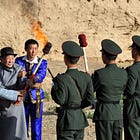How labor mobility shapes lives in Xinjiang?
Passing on voices of Xinjiang workers and answering this question
Nilerbaiyer

When interviewees were questioned about the possibility of being forced into employment, many would express astonishment, and say "Work is an integral part of our lives; why would anyone be compelled to do what sustains them?"
In the vast expanse of China, the employment rate across different regions is uneven. Labor mobility is a policy by the Chinese government to provide surplus labor with job opportunities elsewhere and to increase their employment opportunities, which has been widely implemented across China for a long time.
However, in recent years, some Western politicians, media outlets, think tanks, and non-governmental organizations have never stopped labeling Xinjiang workers' migration to more developed regions in Eastern China as "forced labor." As a native of Xinjiang, I know these allegations are false, so I decided to conduct an in-depth investigation.
Over nine months, my research team and I imbedded ourselves in five factories in Guangdong, speaking with 70 Xinjiang workers, including members from various ethnic groups such as the Han, Uygur, Kazakh, Hui, Xibe, Dongxiang, Daur, and Russian. We aimed to pass on their voices and answer this question: What does labor transfer mean to people from Xinjiang?
Why do they work outside Xinjiang?
China is a populous country, and since the establishment of the People's Republic of China, job security has always been a high priority. Xinjiang, however, has been constrained by harsh natural conditions, a weak industrial foundation, and a lack of professional skills among the workforce. It therefore was once one of the poorest areas in China, with rural workers especially in a state of surplus. To address this, the Chinese government has vigorously implemented pro-employment policies, one of which is the labor transfer program.
Through our research, we have discovered that Xinjiang people choose to work in the country's coastal regions for a variety of reasons. In an interview, a Kazakh worker from Xinjiang said, "I dreamt of going to the seaside, and learning that I could go to Guangdong to work, I signed up. I visited Shenzhen and saw the sea during a holiday, and I want to go to Hainan in the future." Another Uygur interviewee mentioned, "My hometown Hetian is arid while Guangdong is lush, clean and warm all year round. There is no need for moisturizer." These statements indicate that people come to different regions for different life experiences or a more hospitable environment.
A more desirable income in these regions is certainly the most important reason. A Uygur interviewee said, "I used to be a waitress in a county restaurant, earning only 2,000 yuan a month, and my husband was an apprentice in gold jewelry making, earning at most 1,500 yuan a month. Now, we both earn over 5,000 yuan per month, several times higher than before!"
Another Kyrgyz interviewee, who had a low level of education and was long unemployed, could only earn up to 150 yuan a day from unstable odd jobs. "Recruiters from coastal regions said the minimum monthly salary was 4,500 yuan, and we came here after signing a contract. The work is also easier than before, and I earn at least 5,000 yuan a month," he said, clearly satisfied with his current life and income.
Our research also revealed that nearly two-thirds of the workers migrated with their spouses, relatives, fellow townspeople, or friends. The stories about working in coastal regions told by relatives and friends sparked curiosity and made those back home more willing to work outside Xinjiang.
It can be asserted that the migration of Xinjiang residents seeking employment in developed coastal regions like Guangdong, Fujian, and Jiangsu is akin to the customary labor mobility observed when individuals from other central and western provinces of China migrate for work. This labor exodus represents a naturally occurring movement of the workforce, spurred by both emotional motivations and economic incentives, conducted willingly and autonomously.
What protections are afforded?
The research we've undertaken indicates that workers from Xinjiang employed in coastal regions enjoy the same labor rights as workers from other provinces. They are entitled to religious freedom, the use of their native language and script, choosing where they live, and adherence to halal dietary customs in their workplaces.
For instance, the majority of enterprises we looked into operate from 8 a.m. to noon and then from 3 to 7 p.m. During peak periods with an abundance of orders, employees often work two extra hours a day, and are compensated with overtime pay. Additionally, those on the night shift receive a night meal at 11 p.m., and many show a preference for these shifts due to the higher wages offered.
Xinjiang workers are valued for their dependability, with numerous individuals remaining employed for substantial durations. At one particular business we surveyed, a significant majority of the workers from Xinjiang had been placed in crucial technical roles, reflecting a high level of trust and absence of biased treatment.
Furthermore, certain factories go the extra mile to ensure that Xinjiang workers, who travel great distances for their jobs, have comfortable work and living conditions. Some provide married couples accommodations free of rent, requiring only that they pay for utility fees. A lot of factory canteens offer complimentary meals, and to suit the religious dietary preferences of Xinjiang workers. Some even enlist the services of chefs from Xinjiang. Each time the traditional festivals of Corban and Roza come around, celebratory events are organized by the factories. "During the festivals, I dress in my ethnic clothes and we perform just as we do back home," one Uygur respondent remarked.
It should be highlighted that throughout our time closely interacting with the workers, the baselessness of the "forced labor" allegations became evident not only through formal interviews and studies but also through the myriad aspects of the workers' lives—on and off work. They often invited us to partake in city center outings for late-night food or karaoke after shifts. If they lacked personal freedom, familiarity with these hangout spots would be highly unlikely.
What transformations have been observed?
We sought to dig deeper in our exploration into the lives of Xinjiang workers in coastal regions rather than simply refuting claims regarding "forced labor" and the loss of their rights to vacations and free movement. We aimed to comprehend the broader impact of their work experiences outside of Xinjiang on their everyday lives.
During a factory visit, I encountered a woman wearing meticulous makeup on the production line. When I inquired if she always dressed up for work, she confidently replied, "Absolutely. My sense of beauty has increased since coming to Guangzhou." As talked further, her story unfolded. Originally a simple farm wife from the south Xinjiang, life became exceptionally hard after her divorce and the sole responsibility of raising her child fell on her shoulders. She secured a work opportunity in Guangzhou through her village officials. Now, after more than a year, not only has she improved the lives of her child and herself, but she has also radiated confidence and cheer.
In truth, by seeking employment in coastal regions, many people from Xinjiang have the opportunity to immerse themselves in the socio-economic life of the region, which broadens their horizons. They gradually come to appreciate the importance of education and place greater emphasis on their children's schooling. The status of women in both family and society is elevated, and the belief in hard work as a path to prosperity becomes more deeply ingrained in their hearts.
A Uygur interviewee recounted his initial experience, likening it to being in a film. He saw a lot of foreigners who visited the factory for research and tours. "I had only seen foreigners on TV before I came here."
Many workers migrated aiming to earn more money, but soon realized that it was about more than just making money. Learning new skills was also crucial. "In our factory, the heavier and more dangerous tasks are all done by robots. If we don't learn new technology, our future development will be hindered," said a Kyrgyz interviewee.
As many factories use imported machinery, some workers have taken the initiative to learn English in order to operate the machinery well. A Uygur interviewee showed me a small piece of paper, saying, "This is my method for learning English. On one side, I wrote the English names used on the machine, and on the back, I wrote the equivalent in Uygur. I carry these papers in my pocket every day and study them whenever I have a chance."
A Kyrgyz worker shared their journey to coastal regions with their child, saying, "We arrived just as my son was set to begin first grade. I decided that if he could attend school here, we would stay; if not, we would return home. Upon learning of our situation, the manager kindly took us to a school. Now, my child is in junior high, and we plan to work here for a few more years, hoping that he can receive a better education."
The migration of labor has not only improved the income of people from various ethnic groups in Xinjiang, but also significantly enhanced their personal value through improved professional skills and language abilities. More importantly, it has transformed their mindsets and worldviews. According to our research, some of the workers wish to continue working in their enterprises to earn high wages, some hope to move with their families to Guangdong to enjoy the benefits of modern development, and others plan to use their earnings from working to realize entrepreneurial dreams. Whichever choice they make, it is the simplest expression of their pursuit of a better life.
Voluntary and free movement is everyone's right. I vividly recall that during our research, when interviewees were questioned about the possibility of being forced into employment, many would express astonishment. They would counter, "Work is an integral part of our lives; why would anyone be compelled to do what sustains them?"
The views don't necessarily reflect those of DeepChina.
The author is Nilerbaiyer, the Institute for Communication and Borderland Governance at Jinan University.
Editor/ Liu Xian
Translator/ Jiang jing
Related articles
Chief Editor/ Yang Xinhua
Coordination Editor/ Liu Xian
Reviewer/ Liu Li
Copyeditor/ Zhang Weiwei
Image Editor/ Tan Yujie
About DeepChina
DeepChina is an elite academic initiative that offers objective and rational analyses on a broad spectrum of topics related to China, encompassing politics, economics, culture, human rights, diplomacy, and geopolitics.





